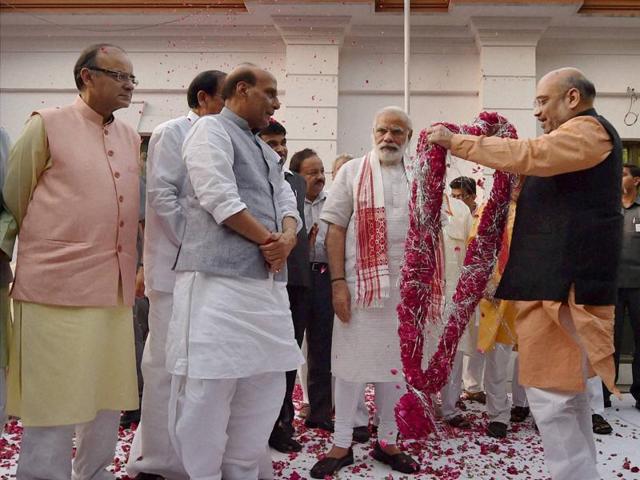Saffron surge a shot in BJP’s arm: Why the outcome is crucial for Modi
The Bharatiya Janata Party’s dramatic gains in the assembly elections may not be a referendum on Prime Minister Narendra Modi’s governance, but they will have a significant bearing on national politics and the pace of economic reforms.
The Bharatiya Janata Party’s dramatic gains in the assembly elections may not be a referendum on Prime Minister Narendra Modi’s governance, but they will have a significant bearing on national politics and the pace of economic reforms.

For one, a diminished and demoralised opposition and friendlier state governments will likely enable and embolden the Centre to carry out its reforms agenda with renewed vigour. The victory also sets the stage for the party to carry the momentum into seven states, including Uttar Pradesh and Gujarat, which will go to the polls next year.
But above all, the BJP’s better-than-expected showing in West Bengal and a debut seat in Kerala, with possibly higher vote share, will help the party shed the limiting image of a predominantly higher caste, north Indian party. And its possible emergence as a pan-India party could see it replace the Congress as the principal opposition for regional forces.
Read: Poll results: Cong ousted in Kerala, BJP wins Assam; Mamata, Jaya retain power
In contrast, the Congress’ six-state loss since the 2014 national elections has undermined its proud status of a national party. That excludes the newly-created state of Telangana and Arunachal Pradesh, where President’s rule forced its ouster. In Jharkhand, it had quit the ruling alliance months before the elections.
In 2013, Rahul Gandhi had said if India is a computer then the Congress was its default option. That software could be crashing but the party appears to have no backup option.
After a series of electoral reverses in 2014, the party sought to revive by piggy-riding regional parties in Bihar. That inspired little confidence in the party rank and file.
Thursday’s results could only add to anxieties over Congress vice-president Rahul Gandhi’s next move.
For the BJP, the news from Bengal and Tamil Nadu must come as pure music. J Jayalalithaa in Tamil Nadu is seen as largely friendly towards the ruling NDA alliance and the trouncing of the Left-Congress combine in Bengal only helps undermine opposition unity in parliament.
For now, a majority of states are either with the NDA or friendly parties. They are likely to throw their weight behind the Modi government’s policies and programmes, weakening the Congress’ influence over big-ticket legislation such as labour reforms and the Goods and Services Tax (GST).
Read: In depth: After Assam, Kerala losses, Congress struggles to stay relevant
The results probably do little for the NDA’s influence in Rajya Sabha. By-elections in June to fill up six Upper House vacancies from Tamil Nadu might add just one more seat to the ruling AIADMK’s tally.
The other states that voted are not due to send Rajya Sabha representatives anytime soon.
The last parliament session saw many BJP lawmakers speak out against ministers, apparently because of unease over the way the party and the government was being run.
Thursday’s results will likely silence the sniping.





